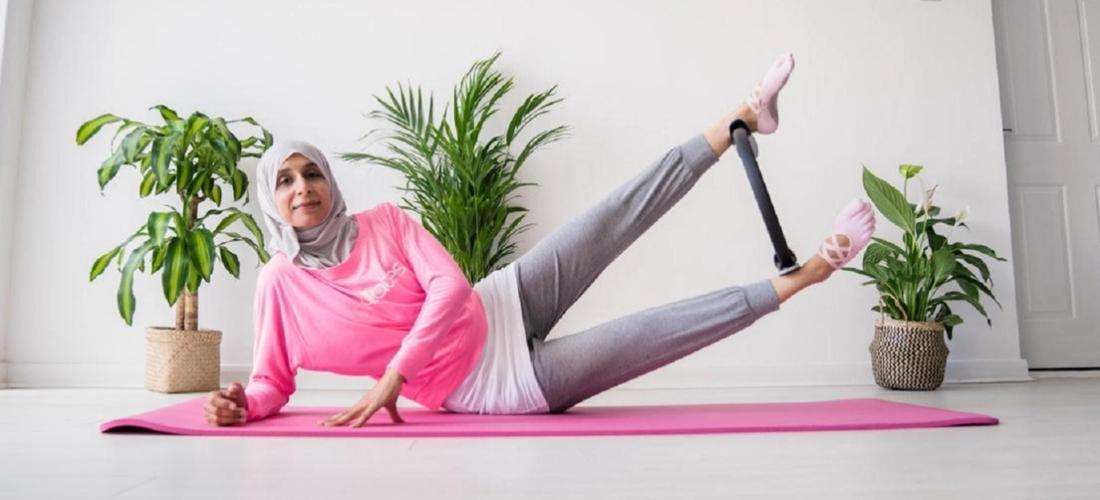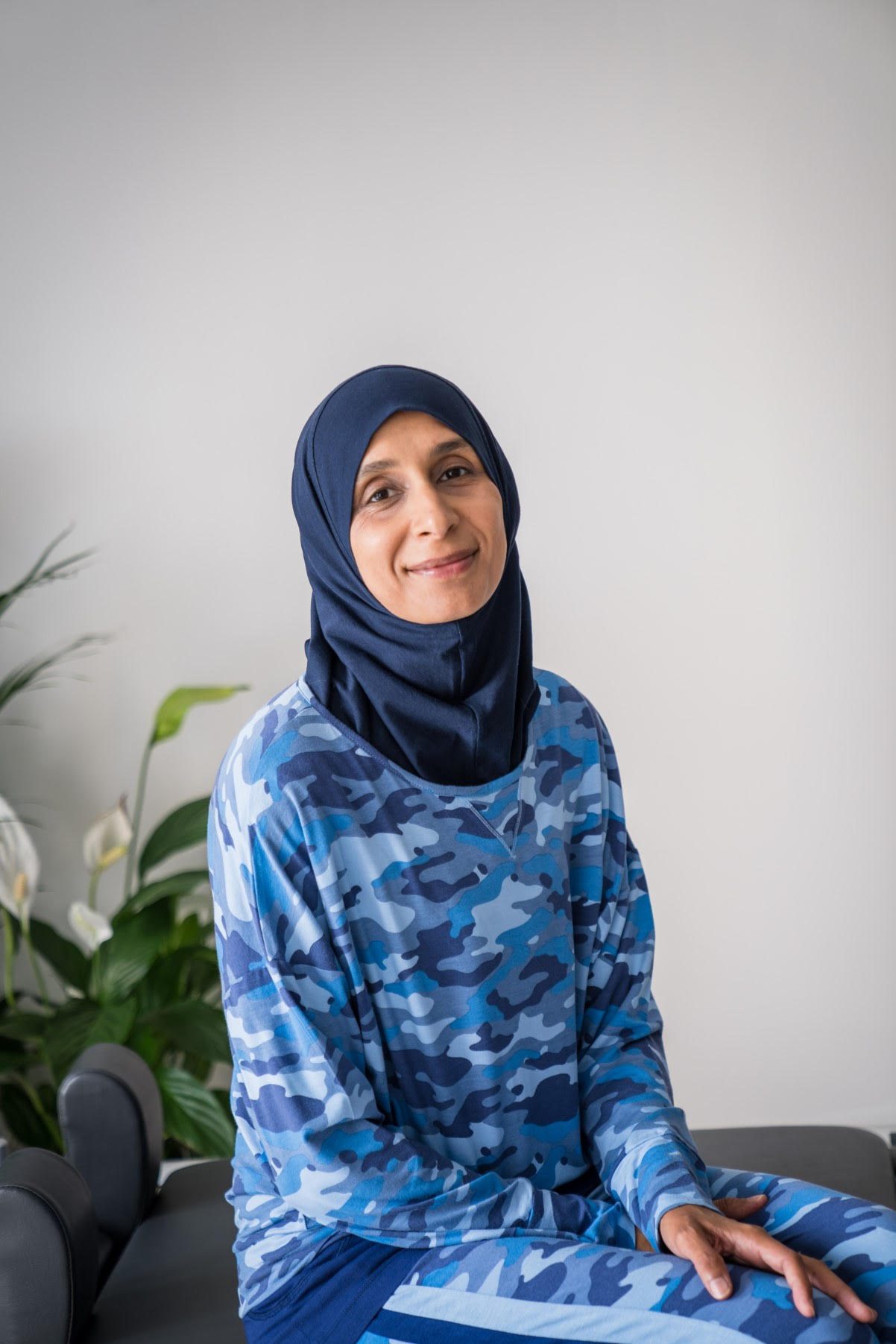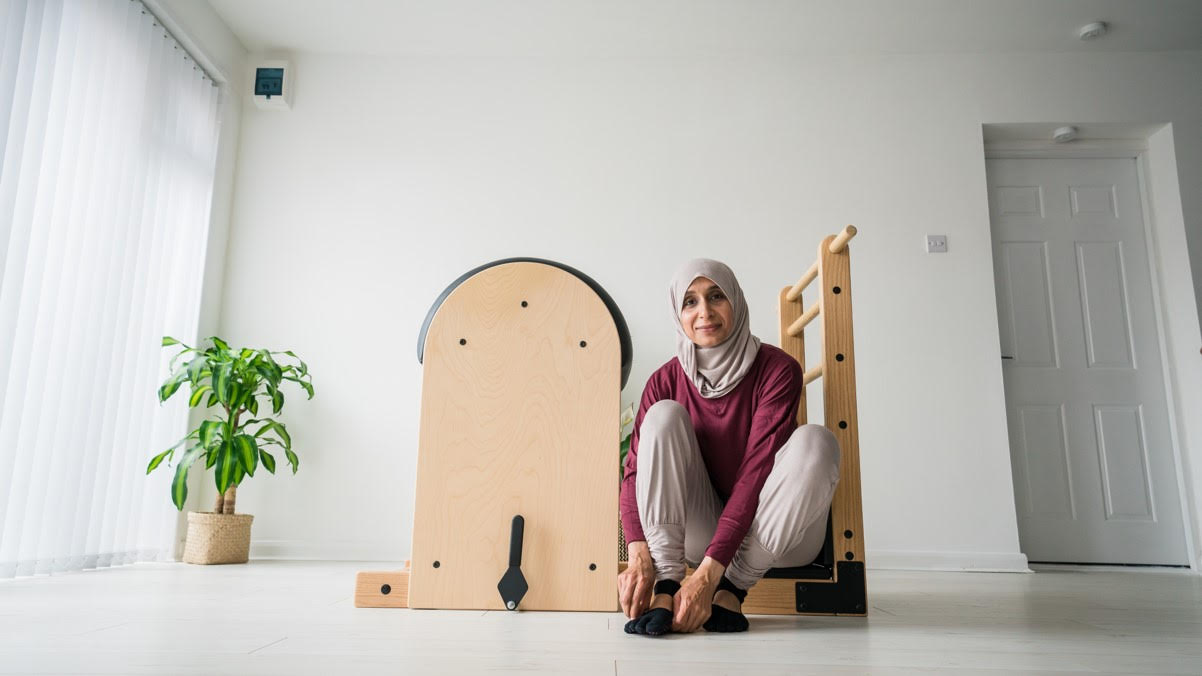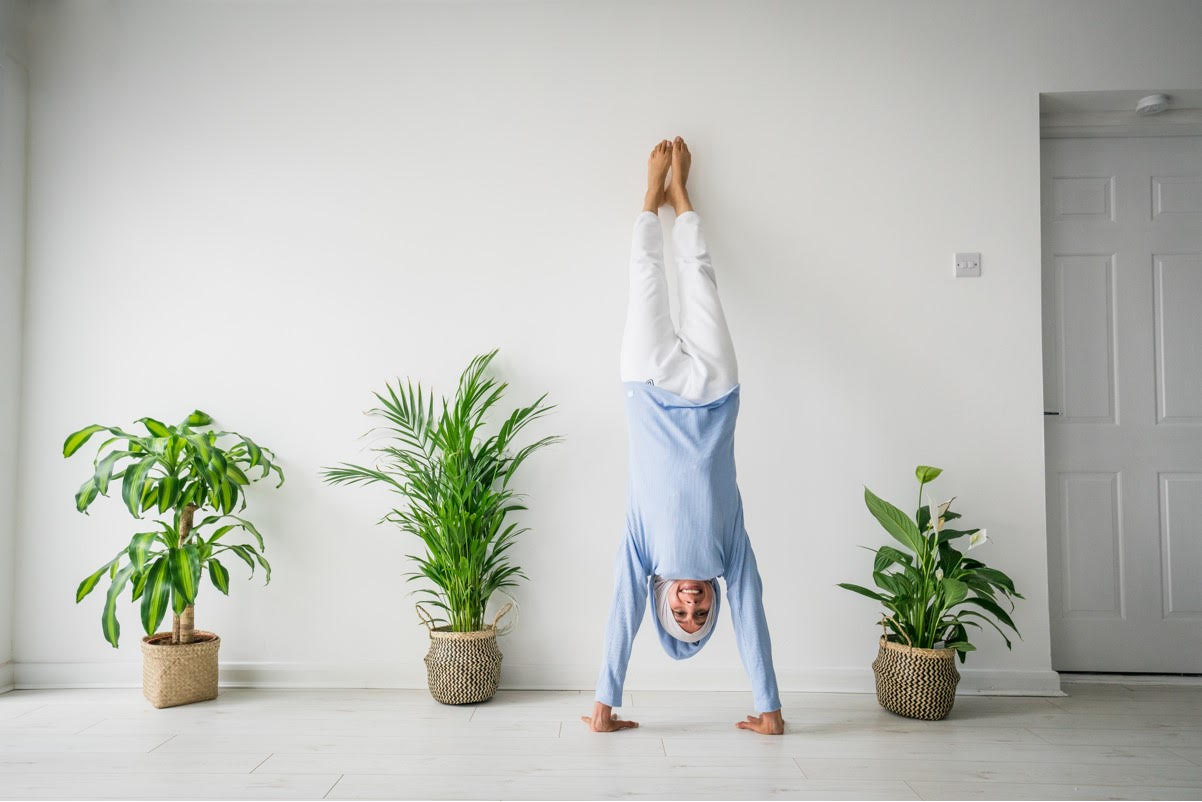Our Bodies are a Gift – Managing Perimenopause & Menopause With Nutrition & Fitness
Lifestyle
|
Jun 29, 2022
|
8 MIN READ

Sahir Ahmed-Evans, an APPI Clinical Pilates Teacher certified in Classical Mat and Equipment Pilates with Peak Pilates
Like so many Muslim women, I’ve taken the idea that I need to care for myself as an act of worship. As the old saying goes, the body is a temple. We should treat it with care because it is truly the main vessel through which we worship and connect with our Creator (S). The Prophet Muhammad (saw) said, “Your body has rights over you” (Sunan Ibn Majah 3851), making it essential that we constantly care for ourselves physically and mentally as part of our spiritual development.
Ideally, we all are striving (or should be) to live healthier lives, to improve our quality of life, and increase our ability to engage in ibadah, thereby deepening our connections to Allah (S), the one who created us.
But, things aren’t going to always be perfect. We will slip up, but that should not deter us from continuing a lifelong journey for better health and well being.
As our bodies change and age, so must the ways we care for it and keep it healthy. What may have worked for us in our teens and 20s may not as we age. Once I entered my 40s, I realized that things like multiple pregnancies, workout injuries and chronic illnesses (like arthritis) made it harder to do what I used to do at the gym. A pulled shoulder made certain moves impossible, but I knew how important it was to keep things moving.
When menopause hit me last year, I had to evaluate a Ramadan with no menstrual breaks while experiencing increased joint pains. I had to reassess my exercise regiment so I could maintain consistent activity, something that became increasingly important to this new stage of my life and body. I also had to think about the best nutrition to help me cope with symptoms and the changes in my body’s new dietary needs.
Life transitions, like perimenopause (meaning “around menopause” – a time when the body starts to transition into menopause) and menopause (the end of menstrual cycles), can influence our diets and how we exercise to maintain optimal health. We want to do what is best for our bodies to keep ourselves mobile and our lives active. I spoke with certified personal trainer Sahir Ahmed-Evans about nutrition for perimenopausal and menopausal women as well as integrating exercises, like Pilates, into a workout routine to keep bodies strong and mobile.
Sahir is an APPI Clinical Pilates Teacher certified in Classical Mat and Equipment Pilates with Peak Pilates. She specializes in training, advising and empowering women, especially those in the perimenopausal and menopausal stages of life. “ I am fiercely passionate about women’s health from youth, pre, post-natal, midlife through to peri-menopause and menopause,” she says. “I believe every woman should be and can be confident and comfortable in her own body.”
How Perimenopause and Menopause Impact Our Health

Sahir Ahmed-Evans
Perimenopause (when our body readies for menopause) and menopause come with a cascade of body changes that will be different for every woman. “Perimenopause and menopause have a huge impact on the health of women,” Sahir explains. “Fluctuating and decreasing estrogen levels can often lead to weight gain and change in body shape even though eating habits haven’t changed. Hot flushes and night sweats can lead to lack of sleep, mood issues and decreased energy, which can become a vicious cycle of feeling awful and living in survival mode.”
“Not only can we struggle with physical symptoms but cognitive symptoms such as brain fog and memory loss are all too common as well as increased anxiety and depression. The highest rate of suicide for women is between the ages of 45-49 years; it is not a coincidence that this is when their hormones are wreaking havoc with them.
“Life is busy and hectic and once we enter this life phase, we are often juggling so many balls [that] we do not prioritize ourselves at all. This can lead to a vicious cycle of symptoms that can cause us to lose our confidence and our sense of self. Women in perimenopause and menopause often tell me they don’t recognize themselves anymore.”
Hormonal and body changes may be scary enough, but add things like hot flashes and mood issues, and it becomes clear that women entering this stage of life need to take the time to focus on themselves and their needs so they can continue to function and thrive.
Nutrition Goals
Nutrition is crucial to our spiritual and physical well-being. Allah (S) says:
Eat of the good things which We have provided for you. [Al-Baqarah 2:173]
Muslims can be keenly alert about what goes into their bodies as far as eating halal versus haram food. However, it is just as crucial to a person’s spiritual, emotional and physical well-being to be self-aware about the impact of the food they eat on all three. One of the most important things women entering perimenopause and menopause should learn is the vital link between nutrition and their symptoms.
“Hormonal fluctuations during perimenopause and menopause can cause so many symptoms – hot flashes, night sweats, brain fog, anxiety, depression, insomnia, joint pains and weight gain are just some of them,” Sahir explains. “Nutritional choices have a huge impact on symptoms. What we choose to eat has a direct effect on our hormone levels, which in turn will affect how we feel physically, mentally and emotionally.
“Making conscious food choices to boost hormones and provide us with the nutrients we need will benefit our health in the short and long term. If I were to advise one nutritional change, it would be to increase protein in our diets, especially to start the day. Protein is a necessity for optimal hormone production and levels affecting everything from energy to mood.”

Sahir Ahmed-Evans
By keeping with the Islamic tradition of being cognizant about what we eat, we secure our spiritual conscious and physical ability to better deal with life changes like perimenopause and menopause.
Keep It Moving
Exercise also plays a pivotal role in our quality of life and the caliber of our worship. Starting or maintaining a workout regime can positively affect perimenopausal and menopausal symptoms that may present challenges like stiffening joints, which in turn can hinder the ability to do things like go down in sajdah for salah. Movement then becomes key, and Sahir explains the importance of exercise.
“Research shows that consistent exercise has been linked to better outcomes in menopause, with fewer hot flushes and milder symptoms,” she says. “Also, exercise and movement release feel-good hormones such as endorphins and serotonin, so they naturally boost mood, increase energy and give us that feel-good factor.
“Daily movement and good nutritional choices are fundamental for hormonal health. Making some simple improvements [in] exercise and nutrition leading up to and during perimenopause and menopause can only have a positive impact on women.
“A balance of cardio, strength and mobility workouts are ideal to maintain muscle strength, bone density, cardio health and flexibility. A decrease in muscle mass and bone density is a result of hormones declining, so maintaining a strong focus on strength training is ideal. Weight training, Pilates and yoga are examples of workouts to strengthen muscles and bones.”
Sahir cautions against going extreme with the cardio but rather to find balance when working out.
“Quite often women find themselves gaining weight and then go hard with cardio and HITT workouts. This can be counterproductive, as such workouts can increase levels of the stress hormone cortisol. This in turn will increase stress levels and negatively impact our other hormones and symptoms. Make strength training your new best friend! Not only will it make you strong, you will look fantastic, [and] you will also feel like a boss woman!
Sahir recommends that women start a program before the onset of perimenopause, when they may start to experience the symptoms like irregular periods, mood swings, hot flashes and sleeping problems. Perimenopause and menopause can occur at different ages for women and can last for different periods of time, so the earlier women can start a sensible nutrition and exercise program, the better.
“If women can establish a regular exercise program prior to perimenopause, they have a greater chance of managing symptoms that may show up once their hormones begin to fluctuate and decline, which can happen as early as their mid-thirties.

Sahir Ahmed-Evans
Whether you are starting out or already have a workout routine, it is a good idea to think about implementing a range of exercises that will encourage overall flexibility and health. Sahir suggests that if they are not already a part of your routine, consider adding exercises like pilates, which target the body’s core, strengthening it.
Give Pilates a Go!
An older body may require us to tailor or retire some forms of exercise, but it may also open our eyes to new ones. The important thing is to explore all the workout options out there. For those unfamiliar with it, pilates may seem strange, but Sahir recommends that perimenopausal and menopausal women think about giving it a try because of the benefits it may give them.
“Pilates has been proven to help with perimenopause and menopause symptoms. It is a total body exercise modality that works on strength, stamina, stability and stretch, making it ideal for this life phase.”
Sahir explains the basics of Pilates.
“The breath is a huge focus during Pilates workouts which benefits the nervous system and overall stress management. Pilates provides full-body integration exercises that focus on the mind-muscle connection. As a result, you must be fully present during your workouts which is hugely beneficial as we are not just in auto pilot mode during workouts.”
Pilates sound great but also seem daunting at first sight, but Sahir assures us that the exercises are good for perimenopausal and menopausal bodies, and one can tailor them to suit their needs. She describes how she uses it to benefit her 40-plus body.
“All Pilates exercises are ideal for this life phase as they are accessible to all bodies and easily modified for the individual. An ideal Pilates session for me would work on the upper body, core and glute, strengthening them as well as working on balance and mobility to aid aching joints. Some of my favorite exercises are on our all fours and plank work, which incorporate all these components.”
Sahir offers advice for women interested in exploring Pilates for the first time. “If someone has never tried Pilates and would like to give it a go,” she says. “I would suggest finding a class with a teacher who can check your form and guide you to get the best from your practice, face to face or online. A good teacher makes all the difference.”
Ready, Set, Go!
We all have the need to focus on caring for ourselves better so we can be better worshippers and honor the bodies Allah (S) gave us. What we must understand is that we have the capacity to do this as well. The key is to think about everything your body may require physically, mentally and emotionally and work on a strategy to give it and ourselves what we need, especially during a critical time like perimenopause and menopause.
“Think of health in terms of the pillars of nutrition, movement, sleep and stress management,” Sahir says. “Make small simple lifestyle changes that prioritize these pillars every day. Make them non-negotiable so that you can manage symptoms of perimenopause and menopause when they do arise.
“Speak to family, friends and those closest to you so that they can support you in the journey to prioritizing your health. Consistency is key; form beneficial habits and stick to them. Health is wealth.”
Want to explore nutrition and fitness? Have questions for Sahir? You can find her on Instagram under the handle @saepilatesandfitness. Are you experiencing perimenopause or menopause? How are you coping? Share with us in the comments below.
Subscribe to be the first to know about new product releases, styling ideas and more.
What products are you interested in?


